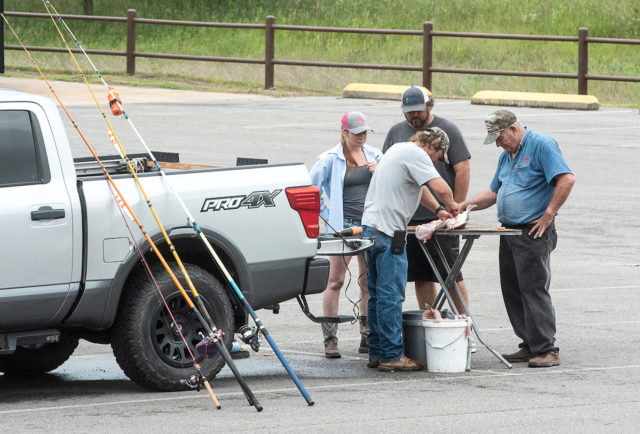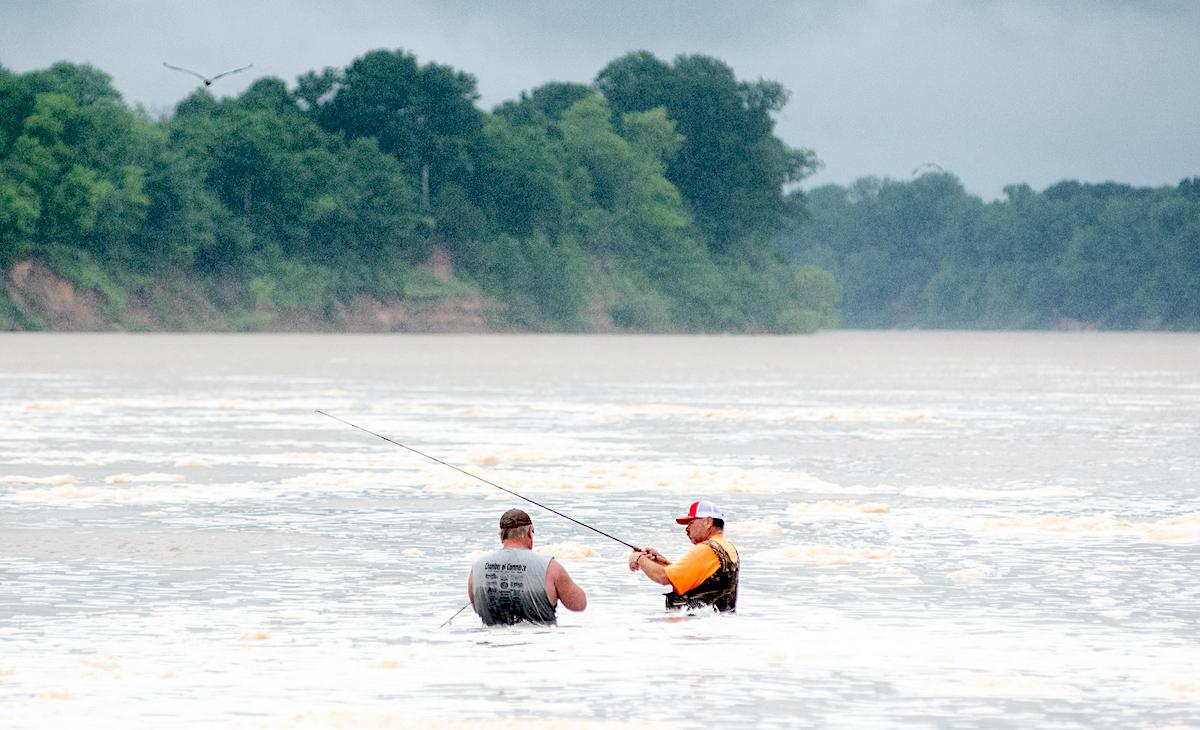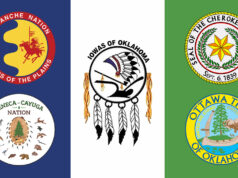
After allowing what he called unfair hunting and fishing licensure compacts with the Cherokee Nation and Choctaw Nation to expire Dec. 31, Oklahoma Gov. Kevin Stitt sent letters to the nations’ leaders Jan. 5 “commencing” a 30-day negotiation period and alluding to potential litigation over the fact that neither tribe ever purchased the minimum number of licenses specified in their compacts.
“As you are aware, the Cherokee Nation did not fulfill its obligation to purchase the minimum number of compact licenses, during any compact year,” Stitt wrote to Cherokee Principal Chief Chuck Hoskin Jr. “Throughout the course of the compact period, the nation fell approximately 284,708 licenses short of the guaranteed minimum. As a direct result of the nation’s breach of the compact terms, the state of Oklahoma has incurred damages in the approximate amount of $12,394,380.90 ($506,416.00 for licenses and $11,887,964.90 in lost federal funding due to the Nation’s failure to meet its obligations).”
Stitt wrote the same letter to Choctaw Chief Gary Batton, saying the unmet compact requirement cost Oklahoma an “approximate amount of $5,127,515.571 ($305,934.00 for licenses and $4,821,581.57 in lost federal funding).”
“By this letter, I am commencing the 30-day good faith negotiation process referenced in Article III, paragraph 1 of the compact, which also provides that the remedy for compact disputes, absent negotiated resolution, is voluntary termination of the compact or suit in federal court,” Stitt wrote to both chiefs. “Given that the compact expired on its own terms, only the latter option would remain available.”
Stitt concluded his letter by saying he would “welcome an in-person meeting” with Hoskin and Batton. In December, Carmen Forman of The Oklahoman reported that negotiations between the state and tribes had dropped off.
“By negotiating in good faith and ultimately remitting payments owed to all Oklahomans, the Choctaw Nation lives up to your recent statement that you signed the compact to benefit all Oklahoma citizen and that the Choctaw Nation will put cooperation above conflict,” Stitt wrote to Batton in wording that was echoed to Hoskin.
On Nov. 30, Batton had responded to Stitt’s initial letter asking to renegotiate the compacts by saying Stitt had shown a “failure to work together for all Oklahomans.” In December, Batton and Hoskin both established new hunting and fishing codes for the Choctaw Nation and Cherokee Nation, although the tribal programs cover access to far less land.
Background on hunting, fishing compacts.
Gov. Mary Fallin initially signed the Cherokee and Choctaw compacts in 2015 and 2016, respectively. The government-to-government agreements authorized the two tribes to purchase combination hunting/fishing licenses for their citizens at only 5 percent of the cost for other Oklahomans, including other tribal citizens. Signed only one year apart, the Cherokee and Choctaw compacts featured different payment requirements and tagging benefits for hunters.
RELATED
‘Conflict’ brews with end of Cherokee, Choctaw hunting and fishing compacts by Tres Savage
The concept behind the reduced-cost licensure compacts involved achieving higher licensure totals that would draw additional federal matching dollars for the state’s wildlife and conservation efforts. The compacts included minimum license purchasing thresholds for the two tribes. The Choctaw Nation compact stated that the tribe agreed to purchase a minimum of 50,000 licenses for citizens age 16 to 64 by June 30 of each year. The Cherokee Nation compact stated that the tribe agreed to purchase and issue a minimum of 150,000 licenses for citizens age 16 to 65.
Statistics from the Oklahoma Department of Wildlife Conservation, however, show that neither tribe ever reached the minimum purchasing amounts agreed to in the compacts. Cherokee Nation license sales hovered between 75 percent and 85 percent of the compact minimum. Choctaw Nation license sales topped out around 43 percent of the compact minimum.
Asked if any Cherokee Nation official had a response to Stitt’s Jan. 5 letter seeking negotiation and back payment for the unmet compact requirement, Cherokee Nation communications director Julie Hubbard provided a statement from Secretary of Natural Resources Chad Harsha, who said a disagreement over proper registration information “ultimately reduced the number of licenses” purchased.
“The governor’s letter significantly misrepresents the facts. As state officials know, the nation stood ready every year to jointly issue all of the 150,000 licenses under the compact. However, the state chose to require social security numbers or driver’s licenses beyond our tribal citizenship cards before it would agree to issue a joint license,” Harsha said. “These extra state requirements were not required by either the compact or federal funding requirements, and these demands ultimately reduced the number of licenses the state issued. It seems the governor now wants to rewrite the facts to shift the blame, which is unfortunate given the tribal wildlife compacts brought tens of millions of dollars in increased tribal and federal funding for the Oklahoma Department of Wildlife Conservation.”
Harsha said the Cherokee Nation is prepared to “protect its treaty rights” if Stitt decides to pursue litigation regarding the unmet compact requirement.
“Apparently, Gov. Stitt is not content just to cancel the compacts and cost our state’s wildlife department millions of dollars in future funding — he appears poised to also waste taxpayer dollars fighting Oklahoma tribes,” he said. “The nation remains hopeful that Gov. Stitt will change course and work cooperatively with Oklahoma’s Indian tribes for the benefit of all 4 million Oklahomans. But if Gov. Stitt insists on filing pointless litigation, the Cherokee Nation stands ready to protect its treaty rights.”
Choctaw Nation director of public relations Randy Sachs initially said Batton’s administration declined to comment on Stitt’s letter, but Sachs later provided a statement on the situation hours after the publication of this article.
“The compact benefitted Choctaw tribal members, the Oklahoma Department of Wildlife Conservation and the citizens of the state of Oklahoma,” Sachs said. “While all parties benefitted and executed the compact with a common understanding with no issues, the governor has chosen to draw a line in the sand only after the Choctaw Nation elected not to accept the terms of the governor’s proposal of an unnegotiated license structure — even after the governor reprised the original compact in yearly renewals and extolled the virtues of the compact when it was last renewed.”
Sachs said Choctaw Nation citizens who held state licenses assisted the state in securing additional federal revenue.
“Should Gov. Stitt pursue legal action, as threatened, the Choctaw Nation will respond to the facts accordingly,” Sachs said. “We remain disappointed and confused that Gov. Stitt focuses so much time and energy on needless conflict with Native American tribes, when we are open to cooperating with him to again benefit our members and all Oklahomans.”
Gov. Kevin Stitt letter to Principal Chief Chuck Hoskin Jr.
 Loading...
Loading...
Gov. Kevin Stitt letter to Chief Gary Batton
 Loading...
Loading...
(Update: This article was updated at 8:55 a.m. Friday, Jan. 21, to include a statement from Randy Sachs.)






















